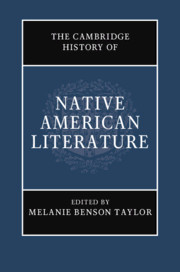Book contents
- The Cambridge History of Native American Literature
- The Cambridge History of Native American Literature
- Copyright page
- Contents
- Figures
- Contributors
- Introduction: What Was Native American Literature?
- Part I Traces and Removals (Pre-1870s)
- Part II Assimilation and Modernity (1879–1967)
- Part III Native American Renaissance (Post-1960s)
- 14 Rethinking the Native American Renaissance: Texts and Contexts
- 15 Marginally Mainstream: Momaday, Silko, Erdrich, and Alexie
- 16 Indigenous Lives, Visual Autobiographies
- 17 Indigenous Writing in Canada
- 18 Reservation Realities and Myths in American Literary History
- 19 Mapping the Future: Indigenous Feminism
- 20 Queer Sovereignty
- 21 Contemporary Indigenous American Poetry
- 22 Contemporary Native North American Drama
- Part IV Visions and Revisions: 21st-Century Prospects
- Index
- References
20 - Queer Sovereignty
from Part III - Native American Renaissance (Post-1960s)
Published online by Cambridge University Press: 18 September 2020
- The Cambridge History of Native American Literature
- The Cambridge History of Native American Literature
- Copyright page
- Contents
- Figures
- Contributors
- Introduction: What Was Native American Literature?
- Part I Traces and Removals (Pre-1870s)
- Part II Assimilation and Modernity (1879–1967)
- Part III Native American Renaissance (Post-1960s)
- 14 Rethinking the Native American Renaissance: Texts and Contexts
- 15 Marginally Mainstream: Momaday, Silko, Erdrich, and Alexie
- 16 Indigenous Lives, Visual Autobiographies
- 17 Indigenous Writing in Canada
- 18 Reservation Realities and Myths in American Literary History
- 19 Mapping the Future: Indigenous Feminism
- 20 Queer Sovereignty
- 21 Contemporary Indigenous American Poetry
- 22 Contemporary Native North American Drama
- Part IV Visions and Revisions: 21st-Century Prospects
- Index
- References
Summary
For nearly a century now Lesbian, Gay, Bisexual, Trans, Intersex, Queer, and/or Two-Spirit Indigenous writers have addressed the ways the intellectual sovereignty of their lives and art strengthens understandings of Indigenous nationhood. This chapter considers how and why these intersections of queerness and sovereignty have informed the fast-growing canon of queer Indigenous literatures in English. To do so, it examines the rise of queer Indigenous activism and health sovereignty work in HIV education alongside the history of queer Indigenous literatures in what is currently the U.S. and Canada. Looking across the work of writers like Beth Brant, Carole laFavor, Craig Womack, Daniel Heath Justice, Deborah Miranda, Gwen Benaway, Billy-Ray Belcourt, M. Carmen Lane, Tommy Pico, and Joshua Whitehead, the chapter highlights the range and breadth of sovereign embodiments from the 1960s to 2020 and argues that in the present day queer sovereignty holds a radical promise for Indigenous futures.
Keywords
- Type
- Chapter
- Information
- The Cambridge History of Native American Literature , pp. 379 - 394Publisher: Cambridge University PressPrint publication year: 2020

